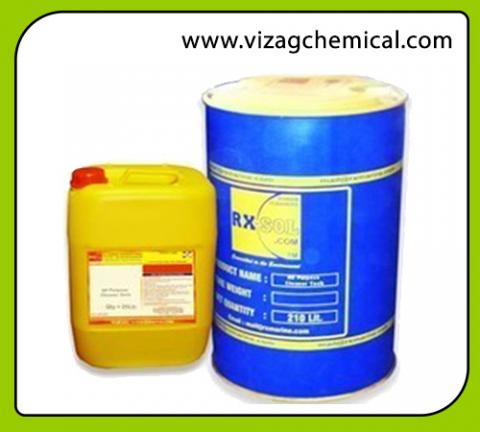Primary tabs

RXSOL H (Aromatic Hydrocarbon)
RXSOL H is a low aromatic white spirit with a flash point above 61ºC, higher than conventional Low Aromatic White Spirit.
RXSOL H is used as an extraction solvent, as a cleaning solvent, as a degreasing solvent and as a solvent in aerosols, paints, wood preservatives, lacquers, varnishes, and asphalt products. RXSOL H is the most widely used solvent in the paint, and oil Field Idustries.
Physical Properties:
PHYSICAL AND CHEMICAL PROPERTIES
Appearance : Colourless Liquid.
Odour : Aromatic
Odour threshold : Data not available.
pH : Not applicable
Toxicity
Rxsol H is mainly classed as an irritant. It has a fairly low acute toxicity by inhalation of the vapour, dermal (touching the skin) and oral routes (ingestion). However, acute exposure can lead to central nervous system depression resulting in lack of coordination and slowed reactions. Oral ingestion presents a high aspiration hazard. Prolonged or repeated skin exposure over a long period of time can result in severe irritant dermatitis, also called contact dermatitis. Exposure to large amounts of RXSOL H in direct contact with the skin (e.g. being soaked with 2 litres) for several hours can cause severe chemical burns.[8] It is recommended that skin exposure be kept to a minimum by use of gloves, and that hands be washed after contact. Occasional exposure to skin is highly unlikely to cause any problems.
Exposure to an average RXSOL H concentration of 240 mg/m3 (40 ppm) for more than 13 years could lead to chronic central nervous system effects. Owing to the volatility and low bioavailability of its constituents, RXSOL H although it is moderately toxic to aquatic organisms, is unlikely to present significant hazards to the environment. It should not however, be purposely poured down the sink or freshwater drain. It should be disposed of correctly wherever possible as per local rule and regulation.
| Property | Unit | Method | Value |
| Density @15°C | kg/l | ASTM D4052 | 0.785 |
| Cubic Expansion Coefficient @20°C | (10^-4)/°C | Calculated | 9 |
| Refractive Index @20°C | - | ASTM D1218 | 1.437 |
| Color | Saybolt | ASTM D156 | + 30 |
| Bromine Index | mg Br/100g | ASTM D2710 | 200 |
| Copper Corrosion (3hr @100°C) | ASTM D 130 | 1 | |
| Doctor Test | D 235 | Negative | |
| Non Volatile Matter | mg/100ml | ASTM D1353 | 1 |
| Distillation, IBP | °C | ASTM D86 | 182 |
| Distillation, EP | °C | ASTM D86 | 206 |
| Relative Evaporation Rate (nBuAc=1) | ASTM D3539 | 0.05 | |
| Relative Evaporation Rate (Ether=1) | DIN 53170 | 200 | |
| Antoine Constant A # | kPa, °C | 6.14569 | |
| Antoine Constant B # | kPa, °C | 1636.33 | |
| Antoine Constant C # | kPa, °C | 200.436 | |
| Antoine Constants: Temperature range | °C | +50 to +175 | |
| Vapor Pressure @20°C | kPa | Calculated | 0.05 |
| Saturated Vapor Concentration @20°C | g/m³ | Calculated | 3 |
| Paraffins | % m/m | GC | 47 |
| Naphthenes | % m/m | GC | 40 |
| Aromatics | %v/v | ASTM D1319 | 12 |
| Benzene | mg/kg | GC | < 3 |
| Sulfur | mg/kg | SMS 1897 | < 0.5 |
| Flash Point | °C | ASTM D93 | 64 |
| Auto Ignition Temperature | °C | ASTM E659 | 281 |
| Explosion Limit: Lower | %v/v | - | 0.7 |
| Electrical Conductivity @20°C | pS/m | - | < 1 |
| Pour Point | °C | ASTM D97 | <-30 |
| Surface Tension @20°C | mN/m | Du Nouy ring | 26 |
| Viscosity @25°C | mm²/s | ASTM D445 | 1.5 |
| Hildebrand Solubility Parameter | (cal/cm³)^½ | 7.7 | |
| Hydrogen Bonding Index | 0.5 | ||
| Fractional Polarity | 0 | ||
| Heat of Vaporization @Tboil | kJ/kg | 270 | |
| Heat of Combustion (Net) @25°C | kJ/kg | 44500 | |
| Specific Heat @20°C | kJ/kg/°C | 2.0 | |
| Thermal Conductivity @20°C | W/m/°C | 0.14 | |
| Molecular Weight | g/mol | Calculated | 158 |
For quality control analyses, local test methods may be applied that are different from those mentioned in this datasheet. Such methods have been validated and can be obtained through other. Rxsol H does not contain detectable quantities of polycyclic aromatics, heavy metals or chlorinated compounds.
Storage : Store Cool and Dry Palce. Keep Far away from direct flame.
